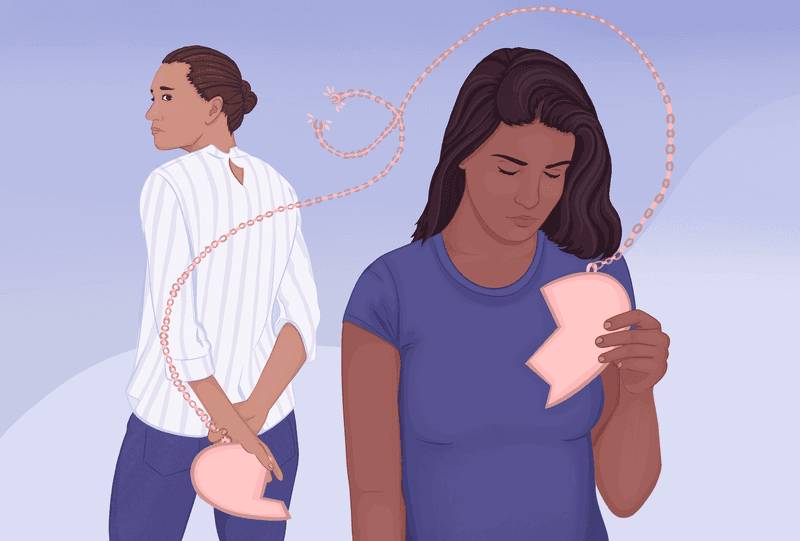15 Thoughts That Prevent You From Moving Forward In A Relationship, According To Psychologists
Exploring the intricacies of relationships, psychologists have identified 15 common thoughts that can hinder personal growth and progress in love.
These thoughts, often rooted in cognitive distortions and limiting beliefs, can prevent individuals from forming deeper connections and moving forward with partners. By recognizing these patterns, individuals can work towards healthier and more fulfilling relationships.
Below are the detailed descriptions of these thoughts, each accompanied by psychological insights and unique illustrative imagery prompts.
1. What if I get hurt again?

For those who’ve experienced heartbreak, the fear of repeated pain can become a mental barrier. This worry about being hurt again often leads to avoidance of deeper connections. According to psychologists, this fear is a natural defense mechanism, protecting individuals from perceived threats. However, it also prevents the growth and exploration that relationships need.
Developing trust, both in oneself and others, is key to moving past this fear. To overcome it, individuals must embrace vulnerability as a strength rather than a weakness. Engaging in open communication and setting healthy boundaries can aid in mitigating such fears, fostering a more resilient emotional state.
2. I’m not good enough for someone better

Feelings of inadequacy can derail even the most promising relationships. When an individual believes they are not good enough, it becomes a selffulfilling prophecy. This mindset often stems from childhood experiences or past relationship failures. Psychologists suggest that self-reflection and positive self-talk can help break this cycle.
Recognizing one’s worth is crucial to building lasting, healthy relationships. This internal dialogue must shift from self-criticism to self-compassion. Building self-esteem is not just about affirmations, but also about acknowledging and celebrating personal achievements, no matter how small.
3. Everyone leaves eventually

The belief that everyone will eventually depart can sabotage intimacy. This thought may arise from past abandonment or loss, leaving an imprint on one’s relational expectations. Psychologists explain that this fear can create a cycle of withdrawal, pushing others away before they have the chance to leave.
To counteract this, it’s essential to cultivate secure attachments and understand the patterns within relationships. A mindful approach to interactions can foster lasting bonds. It’s about trusting in the present and allowing relationships to develop naturally, without the looming shadow of inevitable loss.
4. This is the best I’ll ever get

Settling for less due to the belief that it’s the best one can achieve can prevent genuine happiness. This thought often stems from self-doubt and pessimism, clouding judgment and leading individuals to accept unfulfilling relationships. Psychologists emphasize the importance of aspiration and self-belief. Understanding one’s desires and values can guide better relationship choices. It’s about recognizing potential and seeking partnerships that align with personal growth and satisfaction. The journey involves continuous personal development and a willingness to explore beyond perceived limitations.
5. They’ll change if I love them more

The notion that one can change a partner through sheer love is a common misconception. This thought leads to frustration and disappointment when expectations are unmet. Psychologists advise that acceptance is key to a healthy relationship. Love should not be conditional upon a partner’s change but rather a mutual appreciation of differences.
Efforts to change someone can lead to resentment, creating a cycle of dissatisfaction. Instead, focus on fostering an environment of growth where both parties feel valued and supported. The aim is to love authentically, without the pressure of transformation.
6. I need to fix them before I can leave

Feeling responsible for “fixing” a partner can trap individuals in unhealthy dynamics. This savior complex creates an imbalance, where one feels obligated to mend perceived faults before considering departure. Psychologists note that this mindset stems from a desire for control and validation. It’s crucial to recognize one’s limitations and the autonomy of others.
Relationships thrive on equality and mutual respect, not on rescuing one another. Embracing the imperfections of others, without the need to alter them, fosters genuine connections. Focus on personal growth and understanding rather than control.
7. I don’t know who I am without this relationship

Losing oneself in a relationship can occur when personal identity becomes intertwined with partnership. This loss of self can prevent individuals from pursuing individual goals and desires. Psychologists highlight the necessity of maintaining individuality within a relationship. Engaging in personal interests and self-discovery is essential to sustaining healthy connections.
By nurturing one’s interests, a richer, more balanced partnership can be achieved. It’s about finding harmony between personal identity and shared experiences, ensuring both partners grow individually and together.
8. Starting over is too hard

The fear of starting over can deter individuals from leaving unsatisfying relationships. This thought often arises from uncertainty and fear of the unknown. Psychologists assert that embracing change is integral to growth. Acknowledging this fear is the first step towards empowerment. Change is not merely an end but a gateway to new beginnings and possibilities.
It’s important to approach transitions with optimism and courage. The journey of starting anew is about resilience and the ability to envision a future beyond current circumstances, one filled with potential and growth.
9. It’s too late for me to find love again

The belief that one has missed the opportunity for love can inhibit new relationships. This thought is often rooted in age-related stereotypes and societal pressures. Psychologists emphasize that love knows no age. Opening oneself to new experiences and connections can rejuvenate one’s outlook on relationships.
It’s never too late to find companionship and build meaningful relationships. Embracing this mindset allows for the possibility of finding love at any stage of life. It’s about staying open to new encounters and allowing love to come naturally, without the constraints of age.
10. I’ll be alone forever

The fear of eternal loneliness can lead to clinging onto unhealthy relationships. This thought often stems from past experiences of isolation or rejection. Psychologists suggest focusing on building social connections and nurturing existing relationships. Recognizing the richness of different forms of companionship beyond romantic partnerships can alleviate this fear.
The journey involves understanding that solitude can be a time for personal growth and reflection, not just a void. Finding comfort in oneself and in diverse friendships can create a supportive network that dispels the fear of being alone.
11. Maybe I’m the problem

Self-blame can be a significant barrier to relationship progression. Believing oneself to be the root of all relational issues can undermine self-esteem and create a cycle of guilt. Psychologists advise that self-awareness is important but should not lead to self-deprecation. It’s crucial to differentiate between self-reflection and excessive self-criticism.
Engaging in self-awareness allows individuals to grow and improve without diminishing self-worth. A balanced approach to personal responsibility can enhance relationships, fostering mutual understanding and growth. It’s about learning from experiences and moving forward with kindness towards oneself.
12. I owe it to them to stay

The belief that one owes it to a partner to remain in a relationship can hinder personal growth. This thought often arises from a sense of duty or guilt. Psychologists note that relationships should be based on mutual happiness and respect, not obligation. Understanding that both partners deserve fulfillment allows for healthier dynamics.
It’s important to evaluate personal happiness and the overall relationship quality. Decisions should be guided by a desire for mutual well-being rather than a sense of indebtedness. This approach fosters a more balanced and satisfying relationship landscape.
13. I can’t trust anyone anymore

Trust issues can severely limit relationship potential. Past betrayals might create walls that are difficult to dismantle. Psychologists suggest that rebuilding trust is a gradual process that requires patience and openness. It involves understanding past wounds and working through them constructively. Trust is foundational in any relationship, and its rebuilding is a journey of small, consistent steps.
By practicing transparency and communication, individuals can open themselves to new bonds without the burden of past fears. It’s about allowing oneself to trust again, despite previous disappointments.
14. What will people think if we break up?

The fear of societal judgment can trap individuals in unsuitable relationships. Concerns about external perceptions often overshadow personal happiness. Psychologists assert that prioritizing personal well-being over societal expectations is crucial. Understanding that others’ opinions should not dictate personal choices can liberate individuals from toxic dynamics.
It’s essential to focus on what truly matters—personal happiness and fulfillment. By cultivating inner confidence and authenticity, one can navigate relationships without succumbing to external pressures. This mindset fosters genuine connections and personal freedom.
15. Love is supposed to be hard

The belief that love must be difficult can create unnecessary stress and resistance. This mindset often stems from romanticized portrayals of love as a battlefield. Psychologists highlight that while challenges are natural, consistent hardship is not the hallmark of a healthy relationship. Embracing the idea that love should be nurturing and supportive can transform relational dynamics.
It’s about finding balance and joy in the partnership, rather than constant struggle. Encouraging open communication and mutual respect can create a harmonious relationship, free from the misconception that love must be a constant battle.







